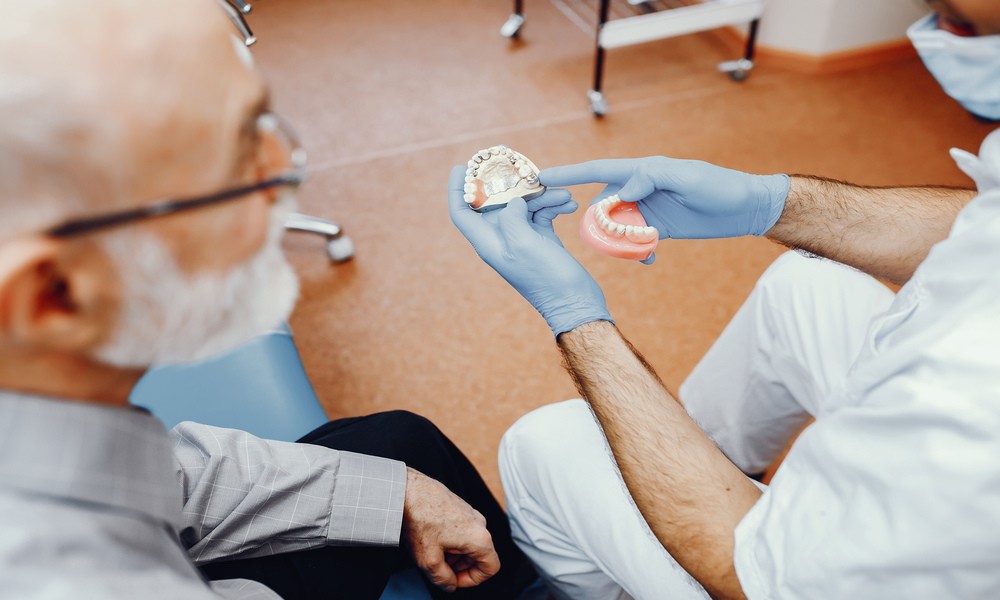Dentures can help restore confidence by improving your smile, but they can cause problems if they don’t fit properly. Some people may ignore loose dentures, assuming it’s a minor issue. However, poorly fitting dentures can lead to serious complications such as gum pain, infections, and difficulty chewing. Over time, they can damage the gums, weaken the jawbone, and make the situation worse. That’s why it’s important to address any discomfort early on to prevent more serious problems down the road.
In this blog, we will discuss why dentures become loose, the problems they can cause, and how to fix them.
How Do Dentures Become Loose?
One should feel comfortable with dentures, but over time, they may start to become loose. Here are some of the reasons why:
- Bone Loss – Teeth roots keep your jawbone stimulated. However, when you lose your natural teeth – your jawbone begins to shrink, the bone weakens and your gums change shape. This can make your dentures feel loose.
- Wear & Tear – Dentures lose their shape over time. Regular activities like chewing, talking, or cleaning can put pressure on the dentures, and eventually, you will begin to feel small changes in their fit.
- Weight Loss – When a person loses a significant amount of weight, the structure of their face and gums also change, which in turn can affect the fitting of dentures.
- Poorly Made or Old Dentures – If your dentures are too old or they never fit properly from day one, they will likely not stay as they should have.
What Are The Hidden Dangers Of Loose Dentures?
Loose dentures may seem like a minor issue to some, but their consequences can be far more serious than expected. They can lead to significant health problems.
1. Pain & Soreness In Gums
Dentures are meant to fit comfortably in your mouth, but when they don’t, they can slip and shift around. While this might not seem like a major issue at first, repeated rubbing against the gums can cause painful blisters and sores. If bacteria enter these open wounds, infections can develop, making it difficult to eat, drink, or even speak. To avoid discomfort and prevent infections, it’s important to address loose dentures as soon as possible.
2. Bone Loss In The Jaw
Loose dentures aren’t just uncomfortable—they place excessive pressure on your gums instead of your jawbone. Your jawbone needs regular stimulation to remain strong, and without it, the bone gradually weakens and loses its natural shape. Over time, this can lead to facial sagging, making you appear older than you are.
3. Difficulty Chewing & Digestive Issue
Eating should be an enjoyable experience, but loose dentures can turn it into a frustrating task. You may start avoiding hard-to-chew foods like meat, nuts, and fresh vegetables—foods rich in essential nutrients your body needs to stay healthy. Without them, you may feel weak or fall ill more often due to poor nutrition.
Loose dentures also make chewing less effective, leaving food in larger pieces. This can lead to bloating and indigestion, as your stomach struggles to break down improperly chewed food. That’s why addressing loose dentures is not just about comfort—it’s vital for your overall health.
4. Speech Problems
Loose dentures can make speaking a challenge. When they slip or shift in your mouth, it becomes difficult to pronounce words clearly. Since communication is a key part of daily life, this can lead to embarrassment when speaking in public or even with friends. Over time, you may begin to avoid conversations, leading to feelings of isolation and a loss of confidence. Fixing loose dentures isn’t just about comfort—it’s about restoring your ability to speak freely, connect with others, and enjoy life without hesitation.
5. Increased Risk Of Oral Infections
Bacteria thrive in warm, moist environments—and loose dentures provide the ideal conditions for them to grow. Food particles can easily get trapped beneath ill-fitting dentures, leading to infections such as stomatitis (inflammation of the mouth) and thrush (a fungal infection). If left untreated, these infections can result in serious oral health issues.
How To Fix Loose Dentures?
Ignoring loose dentures is not an option. There are multiple solutions to fix them:
- Dental Adhesive: These are special powders or pastes to make the dentures stay in place, however, these are not permanent solutions.
- Relining: If you go to your dentist, he can adjust the base of the dentures to improve the fit.
- Denture Replacement: The best solution is to replace the dentures if they are old and weary.
- Dental Implants: This is a permanent solution as they secure the dentures in place and help in preventing bone loss.
How Can You Prevent Loose Dentures In The Future?
To keep your dentures fitting properly, you can follow these tips:
- Visit your dentist regularly, at least once a year.
- Practice good oral hygiene by cleaning your dentures daily and brushing your gums to prevent infections.
- Avoid hard foods more often as they can wear down dentures.
- Store dentures properly in water or denture solution (when not in use) to maintain their shape.
The Last Bite
Loose dentures can be frustrating and they can cause real trouble. They hurt your gums, make eating and speaking difficult, weaken your jawbone, and cause infections. If you feel that your dentures are not the right fit, don’t hesitate to visit your dentist. A dentist can give the best advice and find the right solution for your dental problems. A well-fitting denture can make you comfortable and improve your quality of life.
If you are struggling with loose dentures, book an appointment with Dr. Beena George Dentistry on Britannia Rd. in Mississauga and experience the difference the right fix can make.
Read More: What To Do If Dentures Are Broken?



